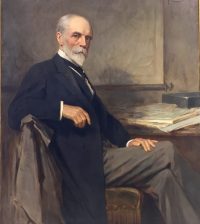Commissioners all a little late coming down. Finally started with Frye, Day, and Gray in carriage—Davis, who has uniformly gone with me, not having appeared. They sent up for him and he arrived a little later with Moore. His clock had been wrong. The Spaniards were in the inner room awaiting us; much more somber than usual and more distantly courteous.
We moved towards the table almost at once, and the protocols were read in English and in Spanish and approved in a moment. Judge Day was to have proposed at this point that the correspondence which had since taken place between Montero Rios and himself should be attached to the last protocol. But the instant the approval of the proposals was announced Montero Rios began presenting their reply. He merely said they had considered the paper presented at the last meeting and desired now to present the reply authorized by their Government. As it was: handed to the translator, Abarzuza suggested that he would better read it over in Spanish before giving the English translation. This was done during a profound and rather painful silence. Ferguson then read it aloud in English. It proved to be exactly what had been foreseen; a maintenance of their conviction of the soundness of their proposals, an unwillingness to reopen the war and subject their country to greater calamities, and a submission therefore to the inevitable.
During the reading all the Spanish Commissioners sat in their places with a certain air of mournful dignity, Cerero with his head bowed on his hands. The American Commissioners were equally sober, and all were in their places excepting Frye, who at the beginning had been walking up and down the outer room. But as the reading of the reply began [he] entered the Salle de Conference and dropped into one of the window seats behind our side of the table.
Nearly all of the American Commissioners were smoking, and before the reading was finished nearly every Spanish Commissioner had also begun on a cigarette. This smoking habit, by the way, has continued from the first week. About the second or third meeting Montero Rios remarked that he had observed in the ante-room that the Americans nearly all smoked. As it was the Spanish custom to smoke even in their legislative assemblies, and during the progress of business, he thought it might conduce to the general comfort if the same rule should prevail here, and there had been a prompt agreement.
As soon as the reading was finished, Judge Day suggested that it might be well now to have formal articles presented on the further subjects on which the American Commissioners had proposed to treat.
Montero Rios remarked that he now wished to follow in the subsequent negotiations whatever course might seem to the American Commissioners most desirable, having in view the wish to expedite matters as well as to avoid long written discussions. Judge Day thought the plan of having tentative articles on other subjects for the proposed treaty submitted at the next meeting might have this effect. Montero Rios repeated that he thought it desirable to get on without further written papers, unless, of course, in the case of something exceptional. Day assented to this, though, of course, reserving all rights under the rules with reference to the filing of papers, provided the American Commissioners should think it necessary.
Montero Rios thought it might be advisable with this understanding to adjourn until the secretaries were ready to report. Day thought they would probably be able to report by Wednesday. Montero Rios said he would be ready to return any day the American Commissioners desired. Day thereupon fixed Wednesday, reserving, as usual, the right of delay in case of unforeseen obstacles. Montero Rios reported that all the Spanish Commissioners desired to urge in that particular was that all possible haste should now be exercised in order to complete the negotiations. To this there was general assent, and the Commission adjourned.
Just as the Americans were preparing to leave the room, the clouds cleared away for a moment, and a burst of sunlight illuminated the green table at which Ojeda was finishing his notes of the protocol. As I happened to be standing at his side at the moment I said to him I hoped that meant good fortune for both countries. He replied rather mournfully: “No, everything is gloom around us.” Abarzuza approached at the instant and I repeated the wish to him. He seemed a shade less despondent, and at least received the expression with a smile.
In a moment or two we had all taken our leave of the Spaniards, who evidently desired to remain. In the ante-room were numbers of French reporters, who besieged me to know first whether the negotiations were now finished, and then when the next meeting was to be. Escaping, I got three of the Commissioners into the carriage with me and drove home. [I was] full of pity for the actors in the depressing scene we had witnessed, and at the same time convinced that they had brought it upon themselves. [They had] made it far worse by their pertinacious obstruction, acrimonious argument, and especially by Montero Rios’ hot-tempered outburst a week ago when the ultimatum was presented. . . .
